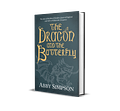Historical Figures–They're Just Like Us!
Dive into the rich history of 1066 England with author Abby Simpson
When I was a younger, fan fiction-driven writer, the thought of writing historical fiction scared me. I’ve always loved to read it. I love watching movies and shows based on historical figures and events. But the stories and the drama inherent in human behaviour–no matter the era–aside, it’s the little details–like pockets, carriages versus coaches, even whether a town existed on maps in the era you’re writing–that are easy to get wrong, and in the process, rip the reader from immersion in the world you’ve created. Sometimes, no matter how much research you’ve done, there’s still an element of deductive guesswork that goes into crafting a historical narrative and you should accept that perfection is unattainable. You didn’t live then, and it’s so hard to know everything.
You’re probably thinking ‘deductive guesswork?’ I know. We’re writers, and we just want to tell stories. But for a history lover like me, historical fiction is the most fascinating genre once you understand the fact that crafting it demands you’re interested enough in the era to spend hours and hours and hours and HOURS researching, and that it will entertain you, not crush your interest in your own tale. You have the stories of the chroniclers to guide you, analysis from eminent historians, and often multiple perspectives on events to use as research to build your story. To some, this is constricting. For me, it’s like a patchwork. You have your narrative, and you have history, and making them fit cohesively, without altering the course of history just to tell your fiction, is the challenge. And it’s hard not to upset one reader or another who might see the same historical events from a different perspective, which is hard for some writers to face.
Historical fiction can’t avoid politics. Social issues are political, history is political, and so is war and/or peace. Some writers (and readers!) have no time for this. They’re not your audience, necessarily, though you can try to craft historical fiction that bakes in the social issues in a way that doesn’t overpower more accessible narratives, like romance or dragons. Like trying to hide veggies into your toddler’s food. Just know that some readers are like the toddler who sees a speck of green and knows exactly what you did; like I said, you can’t avoid politics in historical fiction, and I’m a PoliSci grad. My favourite historical fiction embraces the political and the inherent drama.
But despite these challenges, writing historical fiction makes the past more present, if you will. Abstract stories of other nations’ wars feel like stories that have no impact on us–except these stories shaped our lives, thousands of years before we were born. Historical fiction tells us who we were, and even though we don’t like to listen, it often tells us who we still are, as well. The Norman conquest of England changed Europe forever, and Britain eventually became the global empire on which the sun never set. Would this have happened without the Norman conquest? We can’t know for sure, but we can acknowledge that British colonialism can be traced back to the events of 1066. Entitlement over land and conflict with the French helped build post-Conquest England (later Britain) both physically and emotionally, and these effects have hung around for almost a thousand years in different forms.
The Dragon and the Butterfly attempts to tell the story of Matilda of Flanders in a way that is accessible, interesting, and relatable from an emotional standpoint, even though the average reader can’t picture themselves inside a medieval castle living that medieval life. Whether or not it succeeds is now in the eyes of the reader, and it’s the most exciting time for this little tale since a certain conquest on Hastings Field.
The Dragon and the Butterfly is available now from Lost Boys Press. You can purchase a copy here, and I hope you enjoy this journey into the past.




I have not finished yet, but I am enjoying the early elements about Matilda challenging the traditional roles of women and girls of her time. Learning to read in secret would open so many doors previously locked.